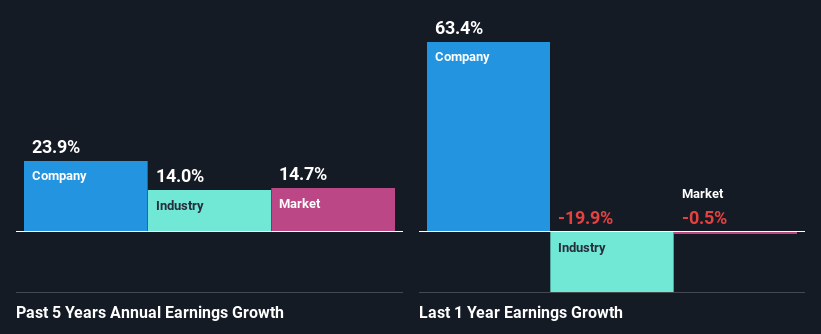Is Ipsen S.A.'s (EPA:IPN) Recent Performance Tethered To Its Attractive Financial Prospects?

Most readers would already know that Ipsen's (EPA:IPN) stock increased by 6.2% over the past three months. Given that the market rewards strong financials in the long-term, we wonder if that is the case in this instance. Particularly, we will be paying attention to Ipsen's ROE today.
Return on equity or ROE is a key measure used to assess how efficiently a company's management is utilizing the company's capital. In simpler terms, it measures the profitability of a company in relation to shareholder's equity.
View our latest analysis for Ipsen
How Is ROE Calculated?
The formula for ROE is:
Return on Equity = Net Profit (from continuing operations) ÷ Shareholders' Equity
So, based on the above formula, the ROE for Ipsen is:
16% = €667m ÷ €4.0b (Based on the trailing twelve months to June 2024).
The 'return' is the yearly profit. Another way to think of that is that for every €1 worth of equity, the company was able to earn €0.16 in profit.
What Has ROE Got To Do With Earnings Growth?
So far, we've learned that ROE is a measure of a company's profitability. We now need to evaluate how much profit the company reinvests or "retains" for future growth which then gives us an idea about the growth potential of the company. Assuming everything else remains unchanged, the higher the ROE and profit retention, the higher the growth rate of a company compared to companies that don't necessarily bear these characteristics.
Ipsen's Earnings Growth And 16% ROE
At first glance, Ipsen seems to have a decent ROE. Especially when compared to the industry average of 8.7% the company's ROE looks pretty impressive. This certainly adds some context to Ipsen's exceptional 24% net income growth seen over the past five years. We reckon that there could also be other factors at play here. For example, it is possible that the company's management has made some good strategic decisions, or that the company has a low payout ratio.
As a next step, we compared Ipsen's net income growth with the industry, and pleasingly, we found that the growth seen by the company is higher than the average industry growth of 14%.

The basis for attaching value to a company is, to a great extent, tied to its earnings growth. What investors need to determine next is if the expected earnings growth, or the lack of it, is already built into the share price. This then helps them determine if the stock is placed for a bright or bleak future. Is Ipsen fairly valued compared to other companies? These 3 valuation measures might help you decide.
Is Ipsen Efficiently Re-investing Its Profits?
Ipsen's three-year median payout ratio to shareholders is 15%, which is quite low. This implies that the company is retaining 85% of its profits. This suggests that the management is reinvesting most of the profits to grow the business as evidenced by the growth seen by the company.
Moreover, Ipsen is determined to keep sharing its profits with shareholders which we infer from its long history of paying a dividend for at least ten years. Existing analyst estimates suggest that the company's future payout ratio is expected to drop to 11% over the next three years. Regardless, the ROE is not expected to change much for the company despite the lower expected payout ratio.
Summary
In total, we are pretty happy with Ipsen's performance. In particular, it's great to see that the company is investing heavily into its business and along with a high rate of return, that has resulted in a sizeable growth in its earnings. Having said that, the company's earnings growth is expected to slow down, as forecasted in the current analyst estimates. To know more about the company's future earnings growth forecasts take a look at this free report on analyst forecasts for the company to find out more.
New: AI Stock Screener & Alerts
Our new AI Stock Screener scans the market every day to uncover opportunities.
• Dividend Powerhouses (3%+ Yield)
• Undervalued Small Caps with Insider Buying
• High growth Tech and AI Companies
Or build your own from over 50 metrics.
Have feedback on this article? Concerned about the content? Get in touch with us directly. Alternatively, email editorial-team (at) simplywallst.com.
This article by Simply Wall St is general in nature. We provide commentary based on historical data and analyst forecasts only using an unbiased methodology and our articles are not intended to be financial advice. It does not constitute a recommendation to buy or sell any stock, and does not take account of your objectives, or your financial situation. We aim to bring you long-term focused analysis driven by fundamental data. Note that our analysis may not factor in the latest price-sensitive company announcements or qualitative material. Simply Wall St has no position in any stocks mentioned.
About ENXTPA:IPN
Flawless balance sheet average dividend payer.
Similar Companies
Market Insights
Community Narratives


